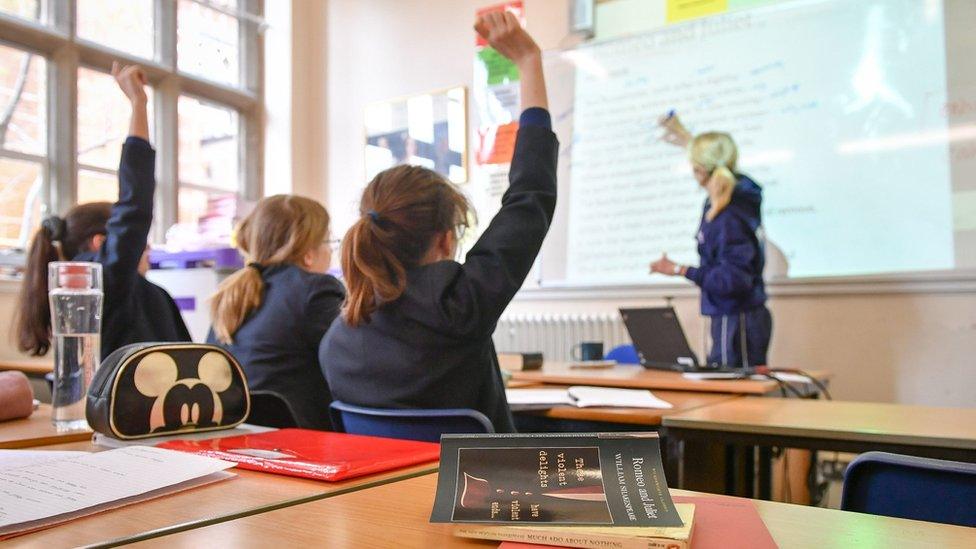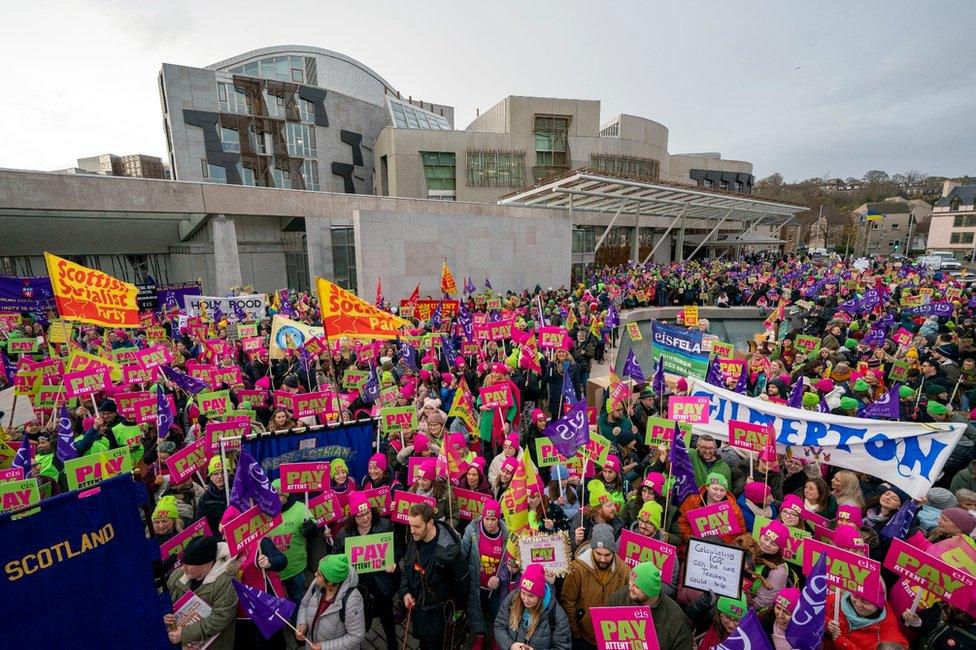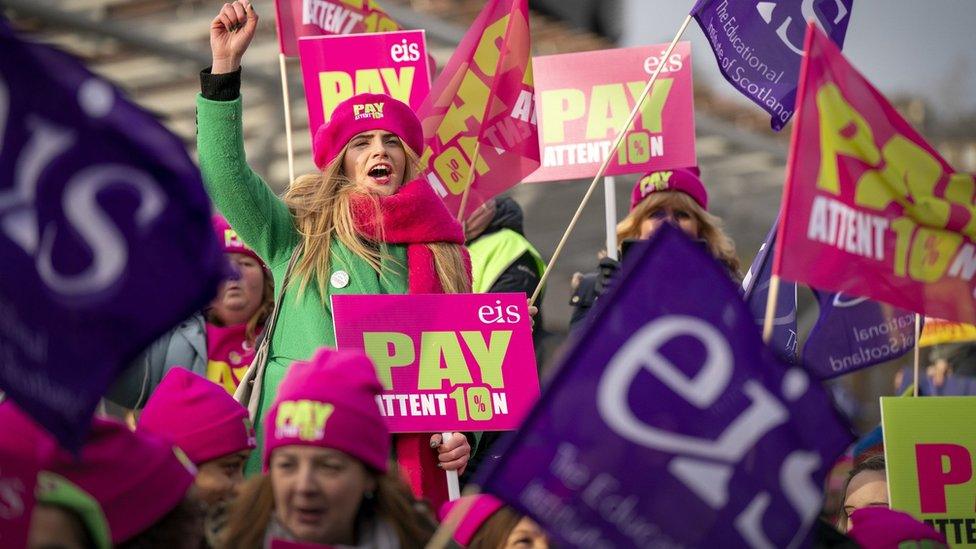'Scope for compromise' on teachers' pay - minister
- Published

Further strikes could be looming
The Scottish government said there is "potential scope for compromise" following talks with teaching unions in a bid to prevent further strikes.
The Scottish Negotiating Committee for Teachers (SCNT) will meet on Monday to discuss pay deal options.
Unions rejected a 5% increase, arguing for 10%. The offer includes rises of up to 6.85% for the lowest paid staff.
Members of the EIS, NASUWT, SSTA and the AHDS trade unions are due to strike on Tuesday and Wednesday next week.
Staff in primary schools will walk out on Tuesday followed by secondary school teachers on Wednesday.
Schools across Scotland are expected to shut during the industrial action.
The SNCT brings unions, the government and councils together to negotiate teachers' pay.
The EIS said it hoped the meeting, which was called at the request of the unions, would advance discussions towards a new offer.
Education Secretary Shirley-Anne Somerville said talks held between the Scottish government and unions on Friday were "constructive and helpful".
She said: "I took the opportunity to make clear how much I value our teaching workforce and recognise the vital importance of reaching a fair and affordable settlement on pay.
"We are open to considering options to resolve this dispute, through the SNCT, and potential scope for compromise.
"I recognise that any deal must be fair and affordable for all concerned, given the unprecedented pressures facing Scotland's budget."

Teachers protested outside of the Scottish parliament during November's walk out
Ms Somerville added she hoped unions would reconsider their plans for industrial action while talks were ongoing.
She said: "Strikes in our schools are in no one's interest - including for pupils, parents and carers who have already had to deal with significant disruption over the past three years."
Cosla spokeswoman for resources Katie Hagmann said there was no additional funding available for an improved pay offer due to financial pressures.
But she acknowledged that reaching a "fair and affordable pay deal" would protect the workforce and those in education.
She added: "I do however, look forward to maintaining constructive and proactive dialogue, which considers all options available, with all parties so that we limit any further disruption for pupils, parents and carers, which we all agree is in no one's best interests."
Des Morris, EIS salaries convener and chair of the teachers' side of the SNCT, said planned strike action would proceed in the absence of a new and improved offer.
Meanwhile, Scottish Conservative leader Douglas Ross criticised the education secretary for not doing enough to avert strike action.
He said: "We know that Shirley-Anne Somerville has done very little with the teacher unions to reach a resolution on this.
"And that's why for the first time in decades we saw teachers striking at the tail end of last year.
"Has anyone heard from the SNP education minister over the Christmas period about what she and her government are trying to do to avert these strikes in the new year? Nothing, not a single thing - it's unacceptable."
'Very fair and affordable'
Earlier, Higher and Further Education Minister Jamie Hepburn said Scottish teachers would be the "best paid in the UK".
Mr Hepburn told BBC Radio's Good Morning Scotland: "If you actually look at what we have offered, it is a 6.85% uplift for the lowest paid teachers, 5% for most and £3,000 for those earning £60,000 or more.
"That would represent a 21.8% cumulative pay increase for most teachers since 2018."
He said the current offer was "very fair and affordable".
Next week's industrial action follows the biggest Scottish teachers strike in decades in November.
Teaching unions in England and Wales are also balloting members over pay.
Most state school teachers in England and Wales had a 5% rise this year, and many teachers in Northern Ireland have been offered 3.2% over the past two years.
Unions argue that with inflation at 10.7%, these increases amount to a real-terms pay cut.
Scotland's biggest teaching union, the EIS, dismissed the offer as "insulting".
The SSTA said the Scottish government must "act and negotiate sensibly" if it values teachers.
NASUWT said the dispute would only end when a "substantially improved pay offer" was on the table.


There now seems to be little realistic chance of averting next week's teachers' strike.
Despite the warm language from the government there was, as expected, no new pay offer today.
A meeting of the committee which negotiates teachers' pay will take place on Monday at the unions' request.
But a fresh pay offer then would seem unlikely too. The most the unions hope for is that the meeting will advance discussions toward a new offer.
Realistically it would be hard to stop school closures on Tuesday, even if there was a breakthrough on Monday afternoon.
The unions have a number of concerns about the current pay offer.
Firstly, it simply fails to keep pace with inflation.
Secondly, the offer is differentiated - with higher percentage rises for those on the lowest salaries.
Thirdly, those on more than £60,000 - essentially some heads and deputes - will receive a flat pay rise of £3,000. The unions do not want the gap between those in senior posts and classroom teachers to be eroded - in part to ensure these posts can be filled.

Are you taking part in the strikes? Are you a parent who is affected by the industrial action? Email: haveyoursay@bbc.co.uk, external.
Please include a contact number if you are willing to speak to a BBC journalist. You can also get in touch in the following ways:
WhatsApp: +44 7756 165803, external
Tweet: @BBC_HaveYourSay, external
Or fill out the form below
Please read our terms & conditions and privacy policy
If you are reading this page and can't see the form you can email us at HaveYourSay@bbc.co.uk, external. Please include your name, age and location with any submission.
Related topics
- Published25 November 2022

- Published15 April

- Published1 August 2023
